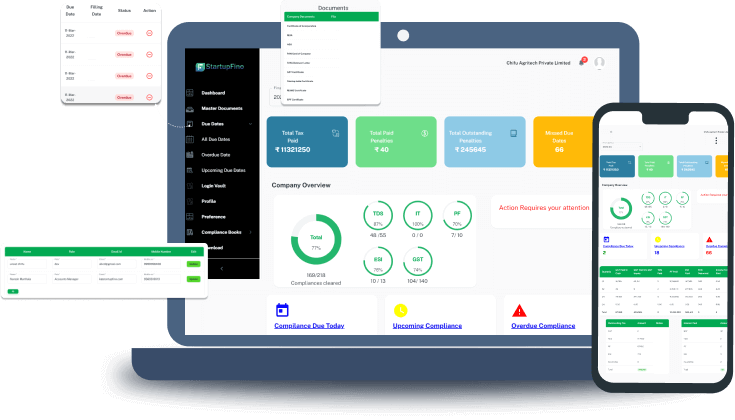In the present times of advanced technology, online payment methods have gained widespread popularity throughout the country. The ease and convenience offered by digital transactions have led to a significant preference for this mode of payment. Consequently, banks and prepaid payment instrument (PPI) issuers have witnessed a consistent increase in efforts to facilitate electronic payment modes for transactions with merchants. This process typically involves the participation of intermediaries like payment aggregators and payment gateway service providers. It becomes essential for these entities to ensure proper Payment Aggregator and Payment Gateway Compliances for their effective functioning in the sector.
Understanding Payment Aggregator and Payment Gateway Compliances
While Payment Aggregator and Payment Gateway Compliances are important to understand, let us understand the basic role of these two entities, their differences and compliances.
Payment Gateway:
A payment gateway is a technology infrastructure or a software application that facilitates and manages online payment transactions between a merchant and the financial institution that processes the payment. It acts as a bridge between the merchant's website or application and the payment processing networks. The payment gateway encrypts payment information, securely transmits it and receives the authorisation or rejection of the payment from the payment processor. However, a payment gateway does not handle or hold funds and it primarily ensures that the transaction data is transmitted securely.
Payment Aggregator:
A payment aggregator licence helps smaller merchants easily sign up to accept online payments. It gathers money from customers for these merchants and keeps it safe in a special account. Once it takes out its fees, it then gives the remaining funds to the right merchants. So, it's like a middle person, making it simpler for small businesses to handle online payments.
Difference between Payment Gateway and Payment Aggregator:
The main distinction lies in their functions. A payment aggregator handles the merchant onboardingand funds collection process, whereas a payment gateway is focused on the secure transmission of payment data and obtaining authorisation for transactions. The payment aggregator is more of a front-end service, dealing with merchants and funds, while the payment gateway is a back-end technology ensuring smooth payment processing.
Payment Aggregator and Payment Gateway Compliances:
Both payment aggregator and payment gateway compliances follow different rules and regulations to operate securely and legally. These rules are important to safeguard the interests of merchants, customers and the entire payment system. The exact rules can differ based on the location and may cover security, data protection, finance and industry-specific needs. Sticking to these rules is vital to uphold trust and legality in the payment processing field.
Compliance Requirements for Payment Aggregators
In dealing with payment aggregator and payment gateway compliances, we will first see the different compliance guidelines and regulations set forth by the Reserve Bank of India for Payment aggregator licence holders in India. To ensure smooth and secure operations, these entities must adhere to several key areas of compliance.
Background Check of Merchants
Payment aggregators are required to perform meticulous background checks on the merchants they onboard, in accordance with RBI's guidelines. This ensures the integrity and trustworthiness of the merchants in the payment ecosystem. Specific compliance measures include:
- KYC / AML / CFT Compliance:
Payment aggregators must strictly adhere to RBI's "Master Direction – Know Your Customer (KYC) Directions" and comply with the provisions of the Prevention of Money Laundering Act and Rules.
- Merchant Antecedent Verification:
Payment aggregators are responsible for conducting comprehensive checks to verify that merchants do not have any malicious intent, such as defrauding customers or selling counterfeit or prohibited products.
- Terms and Conditions Verification:
The guidelines mandate payment aggregators to verify whether appropriate terms and conditions have been uploaded on the merchant's website.
- PCI-DSS and PA-DSS Compliance:
Payment aggregators must ensure that the on-boarded merchants' infrastructure complies with the Payment Card Industry-Data Security Standard (PCI-DSS) and Payment Application-Data Security Standard (PA-DSS).
Grievance Redressal and Dispute Management
RBI's guidelines require payment aggregators to establish a transparent and formal mechanism for addressing customer grievances and managing disputes. Key compliance elements include:
- Nodal Officer:
Each payment aggregator must appoint a nodal officer responsible for handling customer complaints and grievances, as well as managing the escalation matrix.
- Binding Dispute Resolution:
The dispute resolution mechanism should be binding on all participants in the transactions, ensuring fair and effective resolution of disputes.
Security and Risk Management Framework
Security and risk management are paramount in the payment aggregator industry. The RBI guidelines outline specific compliance measures in this regard:
- Information and Data Security Infrastructure:
Payment aggregators must have strong information and data security infrastructure in place to prevent and detect fraudulent activities.
- Board-Approved Security Information Policy:
A comprehensive security information policy, approved by the board, is required to guide security measures.
- Risk Mitigation Implementation:
The information security policy should be effectively implemented to mitigate risks in payment operations.
- Cybersecurity Incident Handling:
Payment aggregators must establish a mechanism to monitor, handle and follow up on cybersecurity incidents and breaches. Any such incidents must be reported to the RBI's Department of Payment and Settlement Systems (DPSS), RBI Central Office Mumbaiand the Indian Computer Emergency Response Team (CERT-In).
- Data Storage Compliance:
Payment aggregators must comply with data storage requirements applicable to Payment System Operators.
- System Audit and Cybersecurity Audit:
Regular system audits, including cybersecurity audits conducted by CERT-In empanelled auditors, are essential. These audits must be performed within two months of the close of the financial year and reported to the respective regional office, DPSS, RBI.
Adherence to these compliance requirements is important for payment aggregators to operate securely, maintain customer trust and comply with RBI regulations.
Reporting Requirements
The reporting requirements for payment aggregator compliances include:
|
Reporting Frequency
|
Report Type
|
Deadline/ Filing Date
|
|
Annual
|
Audited Annual Report on Net Worth certified by a CA
|
By September 30
|
| |
IS Audit Report as well as Cyber Security Audited Report with the observations, corrective and preventive action planned as well as closure data, audited externally
|
By May 31
|
|
Unaudited and Self-Declared Net Worth Certificate
|
By December 31
|
|
Quarterly
|
Auditors’ Certificate on Escrow Balance
|
To be filed by 15th of the month after the quarter-end
|
|
Internally Audited Bankers’ Certificate on Escrow Account Debits and Credits
|
To be filed by 15th of the month after the quarter-end
|
|
Auditors’ Certificate on Nodal Accounts (for Marketplaces)
|
To be filed by 15th of the month after the quarter-end
|
| |
Customer Grievances Report
|
To be filed by 15th of the month after the quarter-end
|
| |
Cyber Security Audit Report
|
To be filed by 15th of the month after the quarter-end
|
|
Monthly
|
Statistics of Transactions Handled
|
To be filed by 7th of the next month
|
|
Reports on Frauds Cyber Security Incident Reports, with root cause analysis and preventive action undertaken
|
To be filed by 7th of the next month
|
|
Non-Periodic
|
One-Time Technical Audit; and whenever a major change is made to process flow
|
As and when necessary
|
|
Change in Board of Director, as and when it happens
|
As and when necessary
|
These reporting requirements are essential for ensuring transparency, compliance and security in the operations of payment aggregators, in accordance with RBI guidelines.
IT-Related Compliance for Payment Aggregators
Payment aggregator entities must adhere to a set of comprehensive IT-related compliance requirements to ensure the security and integrity of their systems and operations. These requirements include various aspects of information technology and cybersecurity.
I. Information Security Governance
Payment aggregators are mandated to establish effective information security governance. Compliance measures include:
- Comprehensive Security Risk Assessment: Conduct a thorough security risk assessment of people, business processes and the environment. This assessment should include all relevant aspects of the operation.
- Reporting to the Board: Regularly report on the results of risk assessments, security compliance and security audit reports to the board of directors. This ensures that the board is well-informed about the security posture of the organisation.
- Internal and External Security Audits: Conduct internal security audits and an annual security audit by an independent security auditor. These audits help identify vulnerabilities and assess the effectiveness of security measures.
II. Data Security Standards
Payment aggregators must adhere to best practices for data security, including compliance with recognised standards like PCI-DSS (Payment Card Industry Data Security Standard) and PA-DSS. These standards ensure the protection of sensitive payment card data and other critical information.
III. Security Incident Reporting
Timely reporting of security incidents and cardholder data breaches is essential. Compliance requirements in this regard include:
- Reporting to RBI: Promptly report security incidents and any cardholder data breaches to the Reserve Bank of India.
- Monthly Cybersecurity Incident Reports: Submit monthly cybersecurity incident reports that include a root cause analysis. This aids in understanding the nature and causes of security incidents.
IV. Merchant Onboarding
When onboarding merchants, payment aggregators should undertake a security assessment to ensure the security of the payment ecosystem.
V. Cyber Security Audits and Reports
Regular cybersecurity audits and reporting are important for maintaining a secure IT environment. Compliance includes:
- Internal and External Audits: Conduct quarterly internal audits and annual external audit reports to evaluate and enhance security measures.
- Vulnerability Assessment / Penetration Test Reports:Bi-annually submit vulnerability assessment and penetration test reports to identify and address vulnerabilities.
- PCI-DSS and Attestation of Compliance: Comply with PCI-DSS requirements and provide attestation of compliance to demonstrate adherence.
- ROC (Report on Compliance) Compliance Report with Observations: Submit a Report on Compliance that includes any observations regarding compliance with security standards.
VI. IT Governance Framework
Develop an IT governance framework to ensure effective IT management and compliance. This framework should include:
- IT Policy: Formulate an IT policy that includes an enterprise information model, cyber crisis management plan and the establishment of an IT steering committee.
Adhering to these IT-related compliance requirements is essential for payment aggregators to maintain the security and trust of their operations while meeting regulatory obligations.
Compliance Requirements for Payment Gateways
In dealing with Payment aggregator and Payment Gateway compliances, we will now look at the compliances for payment gateway licence holders. Payment gateways hold an important role in securing online transactions. They need to follow specific compliance requirements to maintain the quality of their services and safeguard sensitive information.
The key areas of compliance include:
I. PCI-DSS Compliance
Payment Card Industry Data Security Standard (PCI-DSS)compliance is important for safeguarding cardholder data and ensuring secure transactions. Key PCI-DSS compliance measures include:
- Firewalls: Implementing and maintaining firewalls to protect the payment gateway's network from unauthorised access.
- Password Protection: Enforcing strong password protection practices to secure access to payment gateway systems.
- Cardholder Data Protection: Safeguarding cardholder data from breaches and unauthorised access.
- Data Encryption: Encrypting data during transmission to prevent interception.
- Anti-Virus Protection: Employing and keeping anti-virus software current to shield against malware and potential threats.
- Software Maintenance: Consistently updating software and systems to tackle vulnerabilities and enhance security.
- Restricted Data Access: Limiting access to sensitive data to authorised personnel only.
- Unique IDs: Implementing unique user IDs and access controls for data access.
- Physical Access Restrictions: Restricting physical access to cardholder data storage locations.
- Access Logs: Creating and maintaining access logs for monitoring and auditing purposes.
- Vulnerability Scanning: Conducting scans and tests to identify and address vulnerabilities.
12. Policy Drafting: Developing and maintaining policies for secure data access and handling.
II. IT-Related Compliances
In alignment with Reserve Bank of India guidelines, payment gateways must adhere to various IT-related compliance recommendations. These include:
- Information Security Governance: Establishing strong information security governance to oversee and manage security policies and measures.
- Security Incident Reporting: Timely reporting of security incidents to relevant authorities to ensure swift resolution and response.
- Data Security Standards: Implementing data security standards to protect sensitive information, akin to PCI-DSS requirements.
- Merchant Onboarding: Conducting security assessments during the onboarding of merchants to maintain a secure payment ecosystem.
- Cyber Security Audit & Report: Regularly conducting cybersecurity audits and submitting reports to evaluate and enhance security measures.
- IT Governance Framework: Developing an IT governance framework that includes policies, cyber crisis management plans and IT steering committees.
- Risk Assessment: Performing risk assessments to identify potential threats and vulnerabilities to the payment gateway's IT systems.
- Cryptographic Requirements: Ensuring cryptographic measures are in place to protect data during transmission and storage.
- Vendor Risk Management: Managing and assessing the risks associated with third-party vendors and service providers.
These Payment Gateway compliance measures are essential to maintain the security, integrity and trustworthiness of payment gateways in the digital financial sector. Adherence to these standards helps protect sensitive information and ensures secure online transactions.
Why Choose StartupFino for Payment Aggregator and Payment Gateway Compliances?
StartupFino specialises in offering comprehensive services on Payment Aggregator and Payment Gateway Compliances, assisting you from initial advice to ensuring full compliance with essential requirements.
Our services on Payment Aggregator and Payment Gateway Compliances include the following:
Payment Aggregator Compliance Services
- Comprehensive PCI-DSS Expertise: StartupFino provides a wide range of services to help you achieve Payment Card Industry Data Security Standard (PCI-DSS) compliance, ensuring the security of your payment aggregator in India.
- Security Risk Assessment: We specialise in conducting security risk assessments to ensure that your payment aggregator operations meet Indian regulatory standards.
- Cybersecurity Audits and Reporting: StartupFino provides expert cybersecurity audits and detailed reports to support your payment ecosystem in India.
- 4. Efficient IT Governance: Enhance your IT governance with our efficient policies and a well-structured crisis management plan designed for the unique needs of the Indian market.
Payment Gateway Compliance Services
- In-Depth Audits: StartupFino provides comprehensive payment gateway audits that ensure compliance with both local and international standards.
- Strong Data Security Protocols: We specialise in developing and implementing strong security protocols to protect payment data within India.
- Resilient Payment Infrastructure: Ensure the resilience of your payment infrastructure in India with our expert compliance services, for both payment aggregators and gateways.































































